
Related
Guests
- Thalia Pachiyannakisobstetrician-gynecologist who volunteered at Nasser Hospital in Gaza.
- Feroze Sidhwatrauma surgeon who volunteered at the European Hospital in Gaza.
We speak to two doctors who are part of a group of 45 U.S. doctors, surgeons and nurses who have volunteered in Gaza since October 7 and wrote an open letter to President Biden and Vice President Harris, the Democratic presidential candidate, demanding an immediate ceasefire and an international arms embargo of Israel. The group includes evidence of a much higher death toll than is usually cited: more than 92,000 people, which represents over 4% of Gaza’s population. The doctors write, “With only marginal exceptions, everyone in Gaza is sick, injured, or both. Israel’s continued, repeated displacement of the malnourished and sick population of Gaza, half of whom are children, to areas with no running water or even toilets available is absolutely shocking.” The conditions in Gaza are “unacceptable,” and “people know this is wrong but no one is speaking up,” says Dr. Thalia Pachiyannakis, an obstetrician and gynecologist who volunteered at the Nasser Medical Complex. “We all saw evidence of a death toll that is certainly much higher than what is reported by the Gaza Ministry of Health,” adds Dr. Feroze Sidhwa, a trauma surgeon who volunteered at the European Hospital.
Transcript
AMY GOODMAN: As Israel carries out new airstrikes on the Gaza Strip, the United Nations Palestinian refugee agency, known as UNRWA, is reporting nine in every 10 Palestinians in Gaza have been forcibly displaced. Meanwhile, the World Food Programme is warning Israel continues to block delivery of aid, and says it’s been forced to reduce food rations, quote, “to ensure broader coverage for newly displaced people,” unquote. U.N. experts are blaming Israel for the onset of famine in Gaza, accusing it of carrying out a targeted starvation campaign.
Here in the United States, days after launching her White House presidential campaign and skipping Israeli Prime Minister Benjamin Netanyahu’s joint address to Congress, vice president and Democratic presidential candidate Kamala Harris met privately Thursday afternoon with Netanyahu, who also met with President Biden. Harris spoke afterwards.
VICE PRESIDENT KAMALA HARRIS: What has happened in Gaza over the past nine months is devastating. The images of dead children and desperate, hungry people fleeing for safety, sometimes displaced for the second, third or fourth time, we cannot look away in the face of these tragedies. We cannot allow ourselves to become numb
to the suffering. And I will not be silent.
AMY GOODMAN: Harris described her private meeting with Netanyahu as “frank and constructive.” She said nothing about cutting U.S. military assistance for Israel, even as she reiterated calls to finalize a ceasefire deal.
This comes as a group of 45 U.S. doctors, surgeons, nurses who have volunteered in Gaza since October 7th have written an open letter to President Biden and Vice President Harris, demanding an immediate ceasefire and an international arms embargo against Israel. The group of health workers include evidence of a much higher — they say there’s evidence of a much higher death toll than is usually cited: more than 92,000 people, which represents over 4% of Gaza’s population.
Two of the doctors join us now. In South Bend, Indiana, we’re joined by Thalia Pachiyannakis. She’s an obstetrician-gynecologist who returned from Gaza earlier this month after having worked at Nasser Medical Complex in Khan Younis. And joining us from Stockton, California, is Dr. Feroze Sidhwa, a trauma surgeon who volunteered at European Hospital in Khan Younis in the early spring. He worked with the Palestinian American Medical Association in collaboration with the World Health Organization. He recently co-wrote the recent Politico article, “We Volunteered at a Gaza Hospital. What We Saw Was Unspeakable.”
We welcome you both to Democracy Now! Dr. Thalia Pachiyannakis, if you can start off by talking about the conditions and what you are calling on President Biden and Vice President Kamala Harris to do right now?
DR. THALIA PACHIYANNAKIS: The conditions in Gaza were unacceptable and really difficult. We had no soap to wash our hands in the hospital, no drapes, no sterile gowns. You know, we would go to work, and the nurses would say, “We don’t even have water to drink.” So you can imagine the situation for the patients who would walk an hour to the hospital. Pregnant patients, patients with suspected cancer would be walking to the hospital or taking three hours to get there because of transportation issues. There’s no sanitation. It’s unbelievable, the situation over there.
AMY GOODMAN: Talk specifically about what women face. You are an obstetrician-gynecologist.
DR. THALIA PACHIYANNAKIS: Yes. The pregnant women do not — we’ve had, you know, four — when I was there, in just a week, we had four deaths, fetal deaths, because we were unable to monitor the babies. They didn’t have any monitors to monitor women in labor. And so, you know, we had fetal deaths. We also had women coming to the hospital delayed with abruption placenta and babies dying, women experiencing severe wound infections and going to the ICU and being reoperated because, you know, of the sanitation and lack of sterility.
AMY GOODMAN: You addressed this letter not only to President Biden and Vice President Kamala Harris, but also to Dr. Jill Biden — right? — the first lady, a doctor of education. Why did you add her, as well?
DR. THALIA PACHIYANNAKIS: I added her because, you know, the whole infrastructure in Gaza is destroyed. We have, you know, children not being in school for nine months. We have medical students not being able to complete their studies. You know, the universities have been bombed. So, with education being important to Dr. Biden, you know, I think this is why we addressed her.
AMY GOODMAN: Let me bring Dr. Feroze Sidhwa into this conversation. Thanks for joining us once again. We spoke to you right after you had been at European Hospital in Khan Younis. Talk about the organizing of this letter and the significance of what happened this week, right? You have President Biden stepping aside in the presidential race, Kamala Harris being the presumptive nominee. And yesterday, if you can respond to what she said, and if you feel that there’s a difference in Kamala Harris’s approach to what’s happening in Gaza? She skipped Netanyahu’s joint address to Congress. She would have presided over it. But she wasn’t alone. She joined about a hundred congressmembers and senators in skipping that event. Do you feel a different message is being sent?
DR. FEROZE SIDHWA: Yeah. Thanks for having me again.
So, the organizing of the letter — excuse me — the organizing of the letter, you know, a lot of American physicians have been to Gaza since October 7th, and plenty before that, too, but we wanted to focus on the conditions since October 7th. And we basically all saw the same thing. You know, the medical community isn’t that big. We all talk to each other. Actually, I met Thalia just because she randomly happens to be married to a buddy of mine from high school, so, you know, there’s kind of — these connections just blossomed. And it was very clear to us that we all basically saw the same thing.
We all saw evidence of a death toll that is certainly much higher than what is reported by the Gaza Ministry of Health, which is not unusual in wartime at all, but for unusual reasons here. We all saw the targeting of our own healthcare worker colleagues, which really struck us as being unconscionable and just utterly unacceptable. And we all saw the violence directed against children specifically and the way that the violence impacts women, especially pregnant women, like Thalia was saying.
So, we decided to just get together and write a letter. You know, we certainly could have — we probably could have written a 30-page letter, but we tried to limit it to four pages so that it was readable. There is an appendix to the letter that we put together that is — it’s more data-driven than our personal observations, if people are interested.
But, yeah, regarding Vice President Harris, you know, I was actually listening to the words that you were playing from her, which is that something — it’s not the exact words, something like: “What has happened is terrible. People are being displaced for the second, third or fourth time. We can’t look away. We can’t allow ourselves to be numb. And I will not be silent.” Those are all very nice sentiments, but Israel has made very clear what it’s planning on doing to Gaza. It’s destroying the entire — it actually has destroyed the entire place. That’s already done. Oxfam put out a report recently called “Water War Crimes,” if I’m remembering correctly, that points out that if Israel actually concentrates all of Gaza’s population in the Mawasi area, like it’s trying to, the so-called safe zone, that Palestinians there will have 2.5 liters of water per person per day while they’re there. Then, there will be one toilet for, I think, every 4,500 people. That’s just totally outrageous. I mean, there’s nothing to talk about. There’s nothing to not be silent about. If she becomes the president of the United States, she should stop arms transfers to Israel. And not just to Israel, but she should lead, I would hope, the United States would lead an arms embargo against both Palestinians and Israelis.
AMY GOODMAN: So, let me go back to Kamala Harris. Netanyahu did not mention a ceasefire in his joint address. This is what Kamala Harris said after meeting with him privately, after President Biden did yesterday. So that you can hear it from the top, again, this is Kamala Harris speaking after her meeting with Netanyahu.
VICE PRESIDENT KAMALA HARRIS: The first phase of the deal would bring about a full ceasefire, including a withdrawal of the Israeli military from population centers in Gaza. In the second phase, the Israeli military would withdraw from Gaza entirely, and it would lead to a permanent end to the hostilities. It is time for this war to end.
AMY GOODMAN: Dr. Sidhwa, do you see a difference? Is there daylight between President Biden and Vice President Harris in dealing with Netanyahu and Israel?
DR. FEROZE SIDHWA: Honestly, it’s hard to know. It’d be hard to be worse. So, I’ll say that. But the real question is — so, this is a political question, not a medical one. But with the end of any war, the question is: What’s going to change? Or any conflict, I guess, the question is: What’s going to change? Well, if the war ends but Israel goes right back to the blockade of Gaza that it’s been instituting since from, if my memory is right, 2005 to October 6th of 2023, then nothing is going to change. It’s not just this war that needs to end. The Israeli-Palestinian conflict needs to end. And the U.S. is fueling it with constant arms transfers to Israel and not participating in a global blockade of arms to the region, like Amnesty International called for, I think, more than 10 years ago now.
AMY GOODMAN: Dr. Thalia Pachiyannakis, as you return to the United States, having been to the Nasser Medical Complex in Khan Younis, the message that you’re putting out to your medical counterparts, and what you want people to do in this country at a time when people are particularly galvanized around this issue? We’ve seen protest across the week in Washington, D.C., around the issue of Gaza, leading up to the Democratic convention in Chicago.
DR. THALIA PACHIYANNAKIS: I want everybody to speak up. I want voices. You know, people know this is wrong, but nobody’s speaking up. You know, women are having surgeries without anesthesia and pain medicine. They have major surgeries and only have Tylenol. Imagine that. You know, you have sisters, you have wives, you have mothers. Imagine that. So I want everybody to speak up. And there needs to be a ceasefire.
AMY GOODMAN: Dr. Thalia Pachiyannakis, we want to thank you for being with us, obstetrician-gynecologist, volunteered at Nasser Medical Complex in Khan Younis, and Dr. Feroze Sidhwa, trauma surgeon at European Hospital in Khan Younis, Gaza, where he volunteered, now back in Stockton, where he works, part of a group of 45 U.S. doctors, surgeons and nurses who volunteered in Gaza since October 7th, who wrote an open letter to President Biden and Vice President Harris, demanding an immediate ceasefire and an international arms embargo against Israel.
Next up, the opening ceremony for the 2024 Summer Olympics happens today. We’ll speak with a Lebanese photojournalist who carried the Olympic torch in Paris Sunday to honor journalists wounded or killed on the job. She herself lost her own leg when Israel struck an area of southern Lebanon. She also mourns her Reuters colleague who was killed. Stay with us.
[break]
AMY GOODMAN: “Don’t Drink the Water” by Dave Matthews Band. Dave Matthews joined the thousands in Washington, D.C., to protest Israeli Prime Minister Benjamin Netanyahu’s joint address to Congress. Dave Matthews said he’s “ashamed,” calling it “disgusting.” He also spoke out in solidarity with Gaza from the stage during recent concerts.

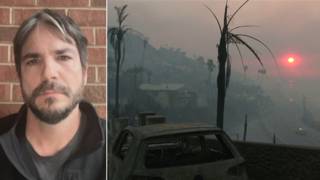
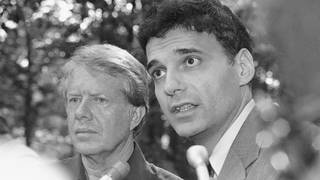
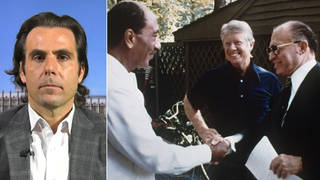
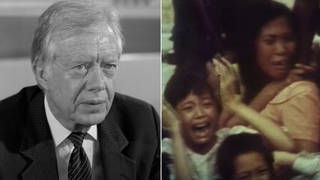





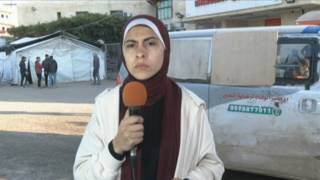
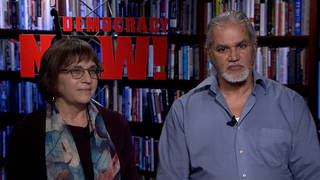
Media Options